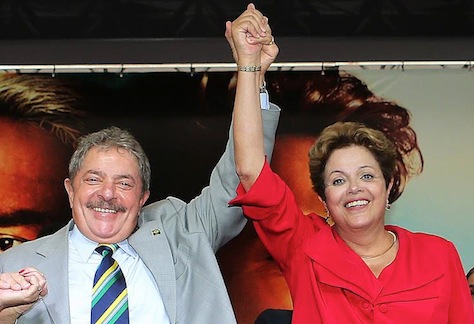It’s still Lula’s Brazil. And it’s perhaps easier to think that Brazil’s October election is less a referendum on president Dilma Rousseff’s reelection, and more the challenge of former president Luiz Inácio Lula da Silva’s Partido dos Trabalhadores (PT, Workers Party) to win a fourth term in the presidential palace at Planalto.![]()
If Rousseff, as polls currently predict, wins a second term, the Workers Party will have governed Brazil from 2003 until at least 2019 — nearly half of the period since the fall of Brazil’s last military regime in 1985.
But polls can be also misleading, and they can easily change over the course the next 65 days until Brazilians vote.
Just ask Colombian president Juan Manuel Santos, who watched a wide double-digit lead evaporate between March and May, when he narrowly lost the first round of Colombia’s presidential election to the more conservative candidate, former finance minister Óscar Iván Zuluaga. Though Santos ultimately defeated Zuluaga in the runoff two weeks later on June 14, it was an incredible scare for the incumbent — and it could have tanked the Colombian government’s historic peace accords with the Fuerzas Armadas Revolucionarias de Colombia (FARC, the Revolutionary Armed Forces of Colombia).
The stakes of Brazil’s general election on October 5 (and runoff, if necessary, on October 26, in the presidential and gubernatorial elections) are no less vital. In addition to the presidency, Brazilian voters will elect all 513 members of the Câmara dos Deputados (Chamber of Deputies), 54 of the 81 Brazilian senators, and the governors of all 26 states and the Distrito Federal.
Brazil remains the largest economy in Latin America, with promising offshore oil exploration, a rising middle class and a dynamic political marketplace. Just two decades ago, the country was rising out of military dictatorship, marked inequality, hyperinflation and economic misery. Rio de Janeiro, the country’s second-most populous city, is set to host the Summer Olympics in 2016, the first South American city to do so.
Nevertheless, Rousseff’s lead is every bit as precarious as Santos’s was in Colombia. In the October 2010 election, Rousseff was forced into a runoff by her more conservative rival José Serra, a former senator and former São Paulo mayor and governor. Though Rousseff ultimately defeated Serra in the second round by a margin of 56.05% to 43.95%, many Brazilians were surprised that Rousseff didn’t win the first-round election outright, as her predecessor, Lula (pictured above with Rousseff), did in 2006.
This time around, she’ll face Aécio Neves (pictured above), the candidate of Serra’s center-right Partido da Social Democracia Brasileira (PSDB, Brazilian Social Democracy Party). Continue reading Rousseff holds weak lead as reelection challenge looms in Brazil




